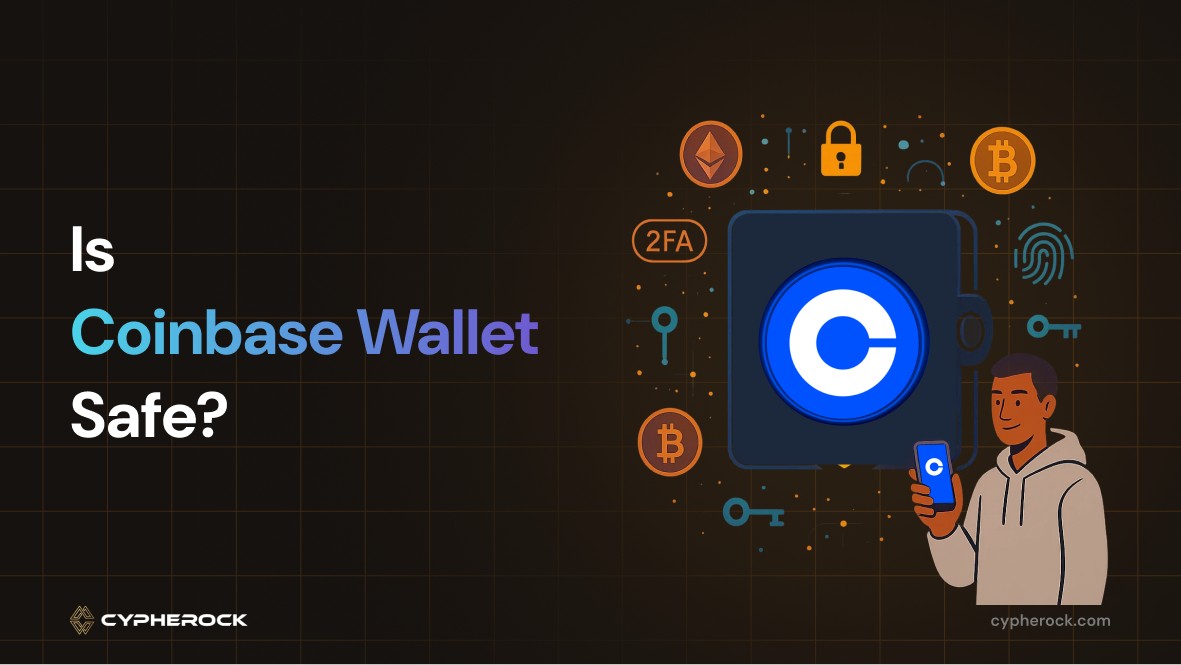

If you’re holding crypto, even just a little, the question of how to keep it safe is bound to come up. Maybe you’ve seen stories of stolen Bitcoin, forgotten seed phrases, or hackers draining wallets. There’s no “undo” in crypto—once it’s gone, it’s gone.
Coinbase is a household name in the U.S. crypto market, known for its easy-to-use exchange. But it also offers a self-custody solution: the Coinbase Wallet. The idea is simple—you hold the keys, you hold the crypto. But does that mean it’s secure?
Let’s unpack what Coinbase Wallet offers, the risks you still need to manage, and why alternatives like Cypherock are getting more attention for long-term security.
Coinbase Wallet is a self-custodial crypto wallet. That means it hands over the keys—literally and figuratively—to you. Your private keys aren’t stored on Coinbase’s servers. You’re the one in charge.
Unlike the Coinbase exchange, where your funds are held in company-controlled wallets, the Coinbase Wallet app gives you full access to your assets. It supports Ethereum, Bitcoin, Solana, Base, and more.
But here’s the catch: with great power comes great responsibility. Lose your seed phrase, and there’s no one to call.
That’s where more secure, decentralized alternatives start to shine. The Cypherock X1, for example, breaks your private key into multiple encrypted shares and stores them across different hardware devices—no single point of failure, no seed phrase to memorize or lose.
This setup works for many, but it also opens up common risks. People lose phones. They forget to write down seed phrases. They click on phishing links. And in all those cases, Coinbase Wallet can’t bail you out.
With Cypherock, recovery doesn’t hinge on a 12-word phrase. Even if one part of your setup is lost or stolen, the remaining pieces can help you securely restore access. That peace of mind is something traditional wallets just don’t offer.
Let’s give Coinbase Wallet credit—it does have solid protections:
Still, it all hinges on you doing everything right. And when it comes to security, relying on human perfection is a gamble.
Coinbase Wallet supports external hardware wallets like Ledger. That’s a big step up from just using your phone.
But consider this: hardware wallets like Ledger and Trezor still store a complete copy of your seed phrase in one place. If someone finds your recovery phrase, game over.
Cypherock rewrites that playbook by splitting your key into five parts using Shamir’s Secret Sharing. You only need any 4 to recover access. No seed phrase ever exists in full at any one location, even you can’t reconstruct it alone. That’s privacy by design.
Coinbase Wallet tries to help you spot scams:
These are useful, but they can only do so much. Your seed phrase is still your Achilles' heel.
Coinbase is publicly traded. That means regulation, audits, and a general air of legitimacy. But that only applies to the exchange—not the wallet. With the wallet, you’re on your own.
Or, sidestep these risks altogether with a setup like Cypherock’s that never exposes the complete seed phrase in the first place.
Pros
Cons
Now compare that to Cypherock:
Sure—it has an easy interface, links smoothly with your Coinbase account, and offers learning tools. But beginner mistakes—like storing a seed phrase on a cloud app or losing your phone—can be costly.
Coinbase Wallet is safe—for the most part. But it puts all the responsibility on you. One mistake, and your crypto could vanish.
That’s why more folks are leaning into tools like the Cypherock X1. It offers a smarter, more fault-tolerant approach to self-custody—especially for people serious about protecting long-term holdings.
Looking for a crypto wallet that doesn’t make you choose between convenience and security? Check out how Cypherock works and decide for yourself if it’s the upgrade your crypto deserves.

Connect with us:
Twitter: @CypherockWallet
Telegram: Join the Community
